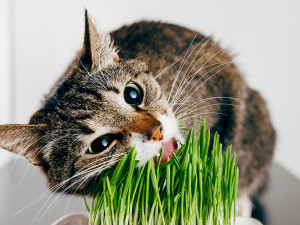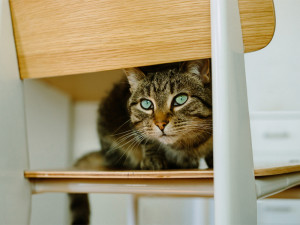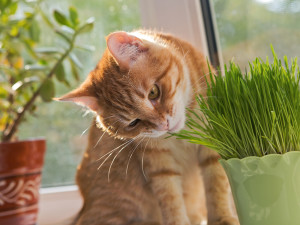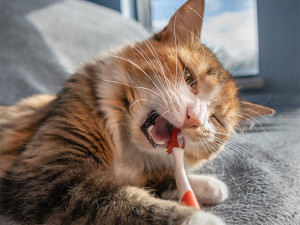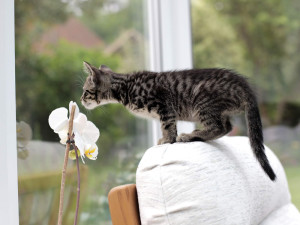Household Plants That Are Toxic to Cats
These plants might be beautiful, but they’re deadly to feline foragers.
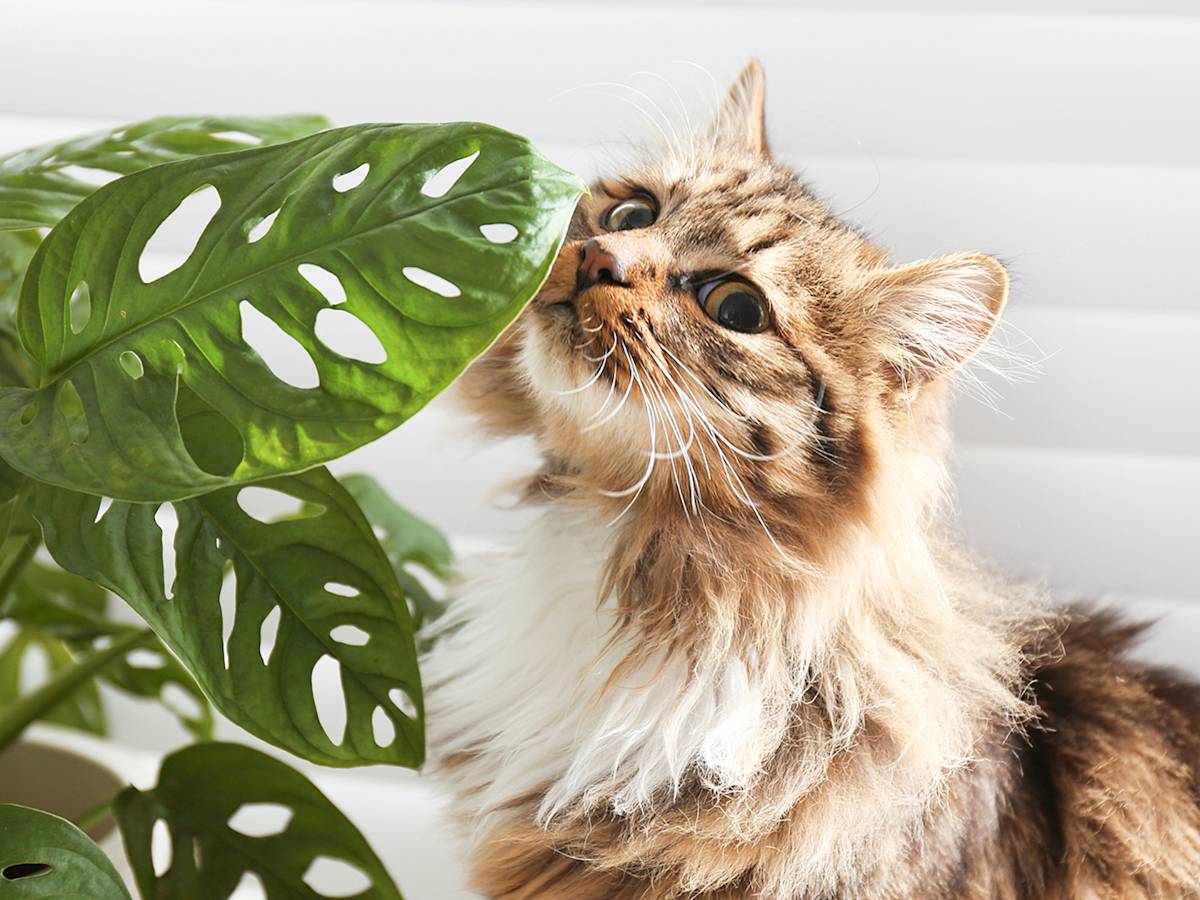
Share Article
Before you made the (best ever) decision to become a cat parent, you may have been one of countless people who eased into parenting by trying to keep a fiddle-leaf fig alive. If you succeeded, you might want to sit down to hear this: Much of your urban jungle may have to be rehomed. Even though cats are carnivores, they enjoy nibbling on plants and flowers from time to time, many of which are toxic to them.
Moving your plants out of reach would work...if your cat was a dog. If this feels like picking a favorite kid, you could try supervising your cat in the company of your plants 24/7 (remember, they are nocturnal), but it’s probably not worth the risk — plus, there are plenty of green thumbs who would love to adopt them.
Below, a record of flora’s worst offenders (to cats and dogs, if you’re a multi-species household).
Autumn crocus
This autumn-blooming plant is extremely toxic to not only cats, but people, too. It’s not a common houseplant, so it only poses a risk if you have an outdoor cat. It’s also referred to as “‘meadow saffron” or “naked ladies.”

Lilies
Lilies are beautiful and smell amazing, but it’s ironic that the flower that symbolizes rebirth can also spell death to your cat. All it takes is a lick of the water in a lily vase to cause irreversible kidney failure. At the risk of sounding alarmist, uninformed cat parents often don’t know what the culprit is until it’s too late — so it’s better to keep these out of the house altogether.
Azaleas
Historically, gifting someone with azaleas in a black vase is a not-so-thinly-veiled death threat (their nectar and leaves are deadly). Need we say more?
Cyclamen
Small bites of this common houseplant, often labeled Persian violet, can induce vomiting. But in large quantities, especially of the tubers or roots, cyclamen can cause seizures and even death.
Daffodils and tulips
Don’t be fooled by daffodil symbolism (hope, luck, prosperity, joy). The flowers and leaves of flowers in the narcissus and tulipa genuses can make cats sleepy and wobbly, but the bulbs are poisonous and can lead to respiratory distress, heart irregularities, and depression.
Ficus, aka fiddle-leaf fig
If ingested, ficus foliage causes drooling, vomiting, loss of appetite, lethargy, and dehydration — all precursors to kidney failure.
Oleander
Oleander is so deadly that Meryl Streep starred in a movie about it. From the laundry list of clinical signs, heart arrhythmia, seizures, and shock should be all you need to hear to steer your cat clear.
Dieffenbachia
Dieffenbachia , aka “dumb cane,” might not kill your cat, but it will burn their mouth, causing difficulty swallowing, choking symptoms, and ultimately organ damage.
Marijuana
Know your cannabinoids: CBD is found in hemp, which has a host of mental and physical benefits for animals. But THC is the main psychoactive compound in marijuana. Even if your cat doesn’t inhale, their heart rate can rise, they can suffer seizures, or even slip into a coma. So, when your cat wants to get high, stick with catnip.
Aloe
Who knew this soothing plant could be a risk to have around? Though it may be known for its healing properties, aloe can cause significant distress if ingested by cats. If your kitty nibbles on aloe, watch out for symptoms like vomiting, diarrhea, and lethargy. The toxic compounds called saponins and anthraquinones are the culprits, making this plant a hidden hazard for feline friends.
Peace lily
Don’t expect a peaceful time if your cat eats this! Peace lilies are beautiful but contain calcium oxalate crystals, which can cause severe irritation when chewed. Symptoms of consuming this plant include drooling, pawing at the mouth, vomiting, and difficulty swallowing. Ingesting even a small amount can lead to significant discomfort and necessitate a visit to the vet.
Pothos
A beautiful, low-maintenance plant that is not so fun for cats. While pothos are popular for their resilience and air-purifying qualities, they can also be toxic — causing oral irritation when ingested. Keeping this plant out of reach is essential for a cat-friendly home.
Jade plants
Known for bringing luck and prosperity, jade plants are unfortunately toxic to cats. If a cat chews on this succulent, it can result in vomiting, lethargy, and incoordination. The exact toxic compound is unknown, but the effects can be quite distressing. As such, jade plants are best kept away from areas accessible to curious cats.
Snake plant
This popular houseplant has a toxin called saponin, which is harmful to cats and can lead to nausea, vomiting, and diarrhea when ingested. The plant’s striking appearance and ease of care make it a favorite among plant enthusiasts, but it’s important to ensure that it’s placed in a spot where cats cannot reach it.
Sago palm
A tropical plant with a dangerous secret — sago palms contain cycasin, a potent toxin. Ingesting even a small part of this plant can cause severe symptoms in cats, including vomiting, diarrhea, liver failure, and even death. The seeds are particularly toxic, making this plant extremely dangerous for feline companions.
English ivy
Slow-creeping vines of trouble! English ivy contains triterpenoid saponins, which can cause vomiting, abdominal pain, hypersalivation, and diarrhea if ingested by cats. The plant’s trailing vines can be particularly tempting for playful cats, so it’s important to keep this ivy out of reach to prevent any potential health issues.
Kalanchoe
Kalanchoe plants contain bufadienolides, which can cause serious health problems for cats. If ingested, symptoms may include vomiting, diarrhea, and, in severe cases, abnormal heart rhythms. These attractive plants should be kept well out of reach to avoid any risk to your pets.
Hyacinth
Spring beauty, but watch out — hyacinths contain alkaloids that can cause significant distress if ingested by cats. Symptoms include vomiting, diarrhea, and tremors. The bulbs are especially toxic, so it’s crucial to ensure these beautiful flowers are kept away from curious kitties who might take a nibble.
Yew
This evergreen spells trouble with taxine causing vomiting, difficulty breathing, and potentially fatal heart issues. All parts of the yew plant are toxic, making it extremely dangerous for cats. Even a small amount can be lethal, so it’s best to avoid having this plant in a household with pets.
Bird of paradise
Exotic elegance with a toxic twist — bird of paradise plants contain hydrocyanic acid, which can cause oral irritation, vomiting, and gastrointestinal upset if ingested by cats. The plant’s striking flowers may attract curious pets, but it’s important to keep them out of reach to prevent any potential health issues.
Chrysanthemum
These fall favorites can lead to vomiting, diarrhea, hypersalivation, and dermatitis in cats. Chrysanthemums contain pyrethrins, which are toxic to felines. While they add a splash of color to your garden or home, it’s crucial to ensure they are kept away from areas accessible to cats.
Poinsettia
Holiday cheer with a side of mild irritation and drooling. Although poinsettias are often considered less toxic than many other plants, they can still cause mild symptoms if ingested by cats. The plant’s milky sap can lead to irritation of the mouth and stomach, resulting in drooling, vomiting, and, in rare cases, more severe symptoms.
Amaryllis
A winter bloom that's not so merry for cats — amaryllis contains lycorine, a toxic substance that can cause vomiting, diarrhea, abdominal pain, and tremors. All parts of the plant are toxic, with the bulbs being particularly dangerous. Keeping these festive flowers out of reach is essential for pet safety.
Asparagus fern
Feathery fronds with a dark side — if ingested, asparagus fern can cause vomiting, diarrhea, and abdominal pain in cats. The berries are particularly toxic, but even the leaves can lead to irritation. It’s best to keep this plant out of reach of pets to avoid any health risks.
Lily of valley
Sweet scent but watch out! Lily of the valley contains cardiac glycosides, which can cause severe symptoms including vomiting, diarrhea, and dangerous heart problems. This plant is highly toxic and can be life-threatening, so it’s crucial to ensure it is kept far away from cats.
Ceriman
A trendy plant with a toxic bite — ceriman contains calcium oxalate crystals that can cause severe oral irritation and vomiting if ingested by cats. The plant’s striking leaves may be attractive, but they pose a significant risk to curious pets. Keeping this plant out of reach is essential for ensuring pet safety.
Dieffenbachia
Big leaves, big trouble! Dieffenbachia contains insoluble calcium oxalates, which can cause intense oral irritation, swelling, and vomiting. If a cat chews on this plant, it can lead to severe discomfort and difficulty swallowing. It’s best to keep this plant out of reach to prevent any potential health issues.
Dracaena
Stylish but sneaky, dracaena plants contain saponins, which are toxic to cats. Ingesting any part of the plant can cause vomiting, loss of appetite, and lethargy. The plant’s striking appearance makes it a popular choice, but it’s important to place it where curious pets cannot reach it.
Sweetheart ivy
Cute name, but not-so-cute effects — sweetheart ivy contains triterpenoid saponins, which can cause vomiting, abdominal pain, and diarrhea if ingested by cats. The plant’s trailing vines can be tempting for playful pets, so it’s crucial to keep it out of reach to avoid any health risks.
Cutleaf philodendron
Leafy greens with a toxic twist — the cutleaf philodendron contains insoluble calcium oxalates that can cause severe oral irritation, drooling, and vomiting if ingested by cats. The plant’s large, attractive leaves may be appealing, but they pose a significant risk to curious pets.
If your cat has ingested any of the above, see a vet ASAP. Check out the ASPCA’s Toxic Plant Listopens in new tab for more plants and flowers toxic to cats.
How to avoid plants that are poisonous to your cat
Keeping your kitty safe from toxic plants involves a bit of planning and awareness. Here’s how you can avoid those sneaky, poisonous culprits:
Toxicity and symptoms are dependent on the plant
Each plant has its unique toxicity levels and symptoms when ingested, and understanding these variations is crucial to keeping your cat safe. By knowing the specific effects of each plant, you can better identify potential issues and react promptly if your cat exhibits any worrying symptoms.
It’s always best to keep a list of toxic plants handy and to be familiar with the specific symptoms they can cause. If you ever suspect your cat has ingested a toxic plant, it’s crucial to seek veterinary help immediately.
Create cat-free zones
If you can’t resist having a few toxic plants, place them in areas that your cat can’t access, like hanging baskets or high shelves. Consider using barriers or netting to keep curious cats away from plants. You can also try plant covers that allow light and air in but prevent access.
Monitor your cat’s behavior
Keep an eye on your cat's behavior around plants. If you notice your cat showing interest in a particular plant, remove it or place it out of reach.
Educate household members
Make sure everyone in your home is aware of the potential dangers of toxic plants and understands the importance of keeping them away from your cat.
Opt for artificial plants
Consider using artificial plants for decoration. They can provide the same aesthetic without the risk.
Common signs of toxic plant poisoning in your cat
Toxic plant poisoning can manifest in various ways depending on the specific plant ingested. Here are some general signs to watch out for:
Vomiting
One of the most common indicators that something is wrong.
Diarrhea
Persistent loose stools can signal poisoning.
Drooling
Excessive salivation is often a red flag.
Lethargy
Unusual tiredness or weakness can be a sign.
Difficulty breathing
Any breathing issues require immediate attention.
Tremors or seizures
These can occur with certain toxins.
Poor appetite
A sudden loss of interest in food can indicate a problem.
Increased thirst and urination
Drinking and urinating more than usual can be symptoms.
Oral irritation
Red, swollen, or painful mouth or tongue.
Abdominal pain
Your cat may show signs of discomfort or pain in the stomach area.
Dilated pupils
Enlarged pupils can be a symptom of poisoning.
When you should take your cat to the vet if you suspect poisoning
If you notice any of the below signs or suspect that your cat has ingested a toxic plant, you should seek veterinary care immediately. Severe symptoms require more urgency when taking your pet to the vet, including:
vomiting blood
loss of consciousness
seizures
difficulty breathing
Always err on the side of caution and consult your veterinarian if you're unsure. It’s better to be safe and ensure your furry friend's health and safety.

Kari Paul
Kari Paul is a Paris-based writer, artist, and filmmaker whose work has been published in The Guardian, The Wall Street Journal, New York Magazine, ELLE, and VICE. She has had an endless march of more than 20 foster kittens, cats, and dogs over the last few years and always cries when they leave. She covers technology, personal finance, and animal behavior, among other topics.

Jackie Brown
Jackie Brown lives in sunny Orange County, CA, where she works as a freelance writer and editor. Her work has appeared in Business Insider, Adopt-a-Pet, Cats.com, The Spruce Pets, and Great Pet Care, as well as National Geographic’s The Secret Life of Dogs (as author) and National Geographic’s Complete Guide to Pet Health, Behavior, and Happiness (as a contributing writer). When she’s not on deadline, you can find her paddling her outrigger canoe in the Pacific Ocean or hiking in the foothills with her two young boys.
Related articles
![Cat sitting on a kitchen chair, looking at the camera]()
How to Cat-Proof Your House
Ten steps for keeping your cat out of trouble.
![Cat sitting on a window sill eating cat grass]()
Sweet Greens: The Best Cat Grass Grow Kits
Not to be confused with catnip (or other buds).
![Cat with a toothbrush]()
7 Cat Dental Products You Never Knew You Needed
Vets explain how fish-flavored toothpastes and nifty finger brushes can prevent more than “tooth fur.”
![Cat sitting on a kitchen chair, looking at the camera]()
How to Cat-Proof Your House
Ten steps for keeping your cat out of trouble.
Are Ferns Toxic to Cats?
They’re great plants to brighten any home. But is your cat safe around them?
![Half-bengal kitten indoors smelling white orchid flowers in a conservatory.]()
Are Orchids Toxic to Cats?
Find out whether you can get that elaborate flower arrangement—or if you should skip it.

